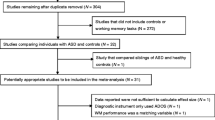Abstract
Earlier investigations have found mixed evidence of working memory impairment in autism. The present study examined working memory in a high-functioning autistic sample, relative to both a clinical control group diagnosed with Tourette Syndrome and a typically developing control group. No group differences were found across three tasks and five dependent measures of working memory. Performance was significantly correlated with both age and IQ. It is concluded that working memory is not one of the executive functions that is seriously impaired in autism. We also suggest that the format of administration of working memory tasks may be important in determining whether or not performance falls in the impaired range.
Similar content being viewed by others
REFERENCES
American Psychiatric Association (1994). Diagnostic and statistical manual of mental disorders (4th edition). Washington, D.C.: Author.
Anderson, J. R. (1982). Acquisition of cognitive skill. Psychological Review, 89, 369-406.
Baddeley, A. D. (1986). Working memory. Oxford: Clarendon Press.
Baddeley, A. D. (1992). Is working memory working? The fifteenth Bartlett lecture. Quarterly Journal of Experimental Psychology, 44, 1-31.
Bennetto, L., Pennington, B. F., & Rogers, S. J. (1996). Intact and impaired memory functions in autism. Child Development, 67, 1816-1835.
Goel, V., & Grafman, J. (1995). Are the frontal lobes implicated in planning functions? Interpreting data from the Tower of Hanoi. Neuropsychologia, 33, 623-642.
Griffith, E. M., Pennington, B. F., Wehner, E. A., & Rogers, S. J. (1999). Executive functions in young children with autism. Child Development, 70, 817-832.
Hughes, C., Russell, J., & Robbins, T. W. (1994). Evidence for executive dysfunction in autism. Neuropsychologia, 32, 477-492.
Lord, C., Rutter, M., & Le Couteur, A. (1994). Autism diagnostic interview-revised: A revised version of a diagnostic interview for caregivers of individuals with possible pervasive developmental disorders. Journal of Autism and Developmental Disorders, 24, 659-685.
Lord, C., Risi, S., Lambrecht, L., Cook, E. H., Leventhal, B. L., DiLavore, P. C., Pickles, A., & Rutter, M. (2000). The ADOS-G (Autism Diagnostic Observation Schedule-Generic): A standard measure of social and communication deficits associated with the spectrum of autism. Journal of Autism and Developmental Disorders, 30, 205-223.
Mottron, L., Peretz, I., Belleville, S., & Rouleau, N. (1999). Absolute pitch in autism: A case study. Neurocase, 5, 485-501.
Ozonoff, S. (1995). Reliability and validity of the Wisconsin Card Sorting Test in studies of autism. Neuropsychology, 9, 491-500.
Ozonoff, S. (1997). Components of executive function in autism and other disorders. In J. Russell (Ed.), Autism as an executive disorder (pp. 179-211). New York: Oxford University Press.
Ozonoff, S., & Jensen, J. (1999). Specific executive function profiles in three neurodevelopmental disorders. Journal of Autism and Developmental Disorders, 29, 171-177.
Ozonoff, S., & McEvoy, R. E. (1994). A longitudinal study of executive function and theory of mind development in autism. Development and Psychopathology, 6, 415-431.
Ozonoff, S., Pennington, B. F., & Rogers, S. J. (1991). Executive function deficits in high-functioning autistic individuals: Relationship to theory of mind. Journal of Child Psychology and Psychiatry, 32, 1081-1105.
Ozonoff, S., & Strayer, D. L. (1997). Inhibitory function in non-retarded children with autism. Journal of Autism and Developmental Disorders, 27, 59-77.
Ozonoff, S., Strayer, D. L., McMahon, W. M., & Filloux, F. (1994). Executive function abilities in autism and Tourette syndrome: An information processing approach. Journal of Child Psychology and Psychiatry, 35, 1015-1032.
Ozonoff, S., Strayer, D. L., McMahon, W. M., & Filloux, F. (1998). Inhibitory deficits in Tourette syndrome: A function of comorbidity and symptom severity. Journal of Child Psychology and Psychiatry, 39, 1109-1118.
Pascualvaca, D. M., Fantie, B. D., Papageorgiou, M., & Mirsky, A. F. (1998). Attentional capacities in children with autism: Is there a general deficit in shifting focus? Journal of Autism and Developmental Disorders, 28, 467-478.
Pennington, B. F. (1994). The working memory function of the prefrontal cortices: Implications for developmental and individual differences in cognition. In M. M. Haith, J. Benson, R. Roberts, & B. F. Pennington (Eds.), Future-oriented processes in development (pp. 243-289). Chicago: University of Chicago Press.
Pennington, B. F., & Ozonoff, S. (1996). Executive functions and developmental psychopathologies. Journal of Child Psychology and Psychiatry, 37, 51-87.
Russell, J., Jarrold, C., & Henry, L. (1996). Working memory in children with autism and with moderate learning difficulties. Journal of Child Psychology and Psychiatry, 37, 673-686.
Shallice, T. (1982). Specific impairments in planning. In D. E. Broadbent & L. Weiskrantz (Eds.), The neuropsychology of cognitive function (pp. 199-209). London: Royal Society.
Author information
Authors and Affiliations
Rights and permissions
About this article
Cite this article
Ozonoff, S., Strayer, D.L. Further Evidence of Intact Working Memory in Autism. J Autism Dev Disord 31, 257–263 (2001). https://doi.org/10.1023/A:1010794902139
Issue Date:
DOI: https://doi.org/10.1023/A:1010794902139




